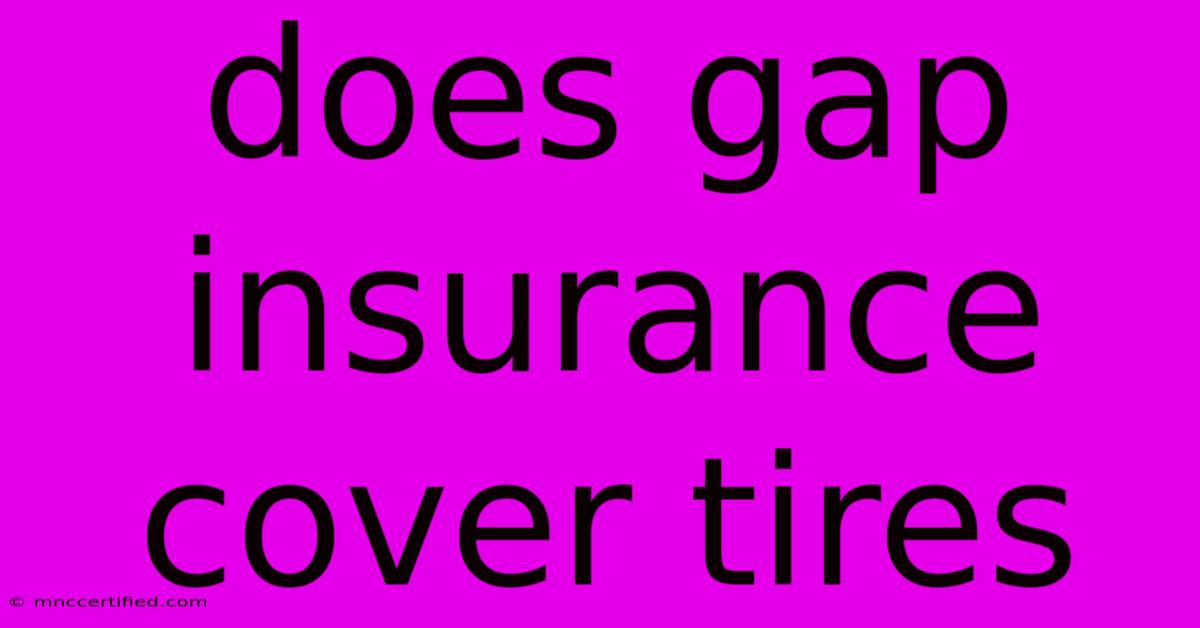Does Gap Insurance Cover Tires

Table of Contents
Does Gap Insurance Cover Tires? A Comprehensive Guide
Gap insurance is a valuable tool for protecting your finances after a car accident or theft, but its coverage is often misunderstood. Many car owners wonder, "Does gap insurance cover tires?" The short answer is generally no. Gap insurance primarily covers the difference between what your car is worth and what you still owe on your loan or lease. Let's delve deeper into the specifics and explore what gap insurance does cover and what it doesn't.
Understanding Gap Insurance
Gap insurance, or Guaranteed Auto Protection, bridges the gap between your car's actual cash value (ACV) and the outstanding balance on your auto loan or lease. If your car is totaled or stolen, your insurance company will typically pay you the ACV. However, if you still owe more on your loan than the ACV, you're left responsible for the difference. This is where gap insurance steps in to cover that shortfall.
What Gap Insurance Typically Covers:
- The difference between the ACV and the loan balance: This is the core function of gap insurance. It protects you from being stuck with a significant debt after a major incident.
- Sometimes, towing and rental car expenses: Some gap insurance policies may include limited coverage for these incidental expenses related to the accident or theft, but this is not standard.
What Gap Insurance Typically Does Not Cover:
- Routine maintenance and repairs: This includes things like tire replacements, oil changes, brake pads, etc. These are considered normal wear and tear.
- Damage from minor accidents: Gap insurance typically only kicks in when the vehicle is deemed a total loss or stolen.
- Tires: Tire damage, even in accidents, is usually covered by your comprehensive auto insurance policy (if you have it), not your gap insurance.
Why Tires Aren't Covered by Gap Insurance
Gap insurance's purpose is to protect against the financial burden of a significant loss – the total loss of your vehicle. Tire damage, even extensive damage, rarely results in a total loss. Your comprehensive auto insurance policy is designed to handle these smaller repairs and replacements.
What Covers Tire Damage?
Your comprehensive auto insurance policy, if you have it, is the most likely source of coverage for damaged tires. However, the specifics depend on your policy and the cause of the damage. Here's a breakdown:
- Comprehensive coverage: This covers damage from events outside of collisions, such as vandalism, theft, fire, or weather-related incidents. If your tires are damaged in a covered event, your comprehensive policy may help with repair or replacement.
- Collision coverage: This covers damage from accidents, including damage to your tires. If another vehicle hits your car and damages your tires, your collision coverage should take care of the costs.
- Deductible: Remember that your insurance will likely have a deductible you'll need to pay before coverage starts.
Checking Your Policy
It's crucial to carefully review your insurance policy documents to understand the specifics of your comprehensive and collision coverage regarding tire damage. The policy will outline what is and isn't covered and the amount of coverage.
Conclusion: Gap Insurance and Tires – Separate Issues
In summary, gap insurance does not cover tires. Tire damage is typically handled by your comprehensive or collision insurance, depending on the cause of the damage. Understanding the distinctions between different types of auto insurance is critical to ensuring you have adequate protection. Always check your specific policy documents for complete details. If you have questions, contact your insurance provider directly.

Thank you for visiting our website wich cover about Does Gap Insurance Cover Tires. We hope the information provided has been useful to you. Feel free to contact us if you have any questions or need further assistance. See you next time and dont miss to bookmark.
Featured Posts
-
Non Owner Sr22 Insurance Maine
Nov 27, 2024
-
Could The Uk Get A 2025 Bank Holiday
Nov 27, 2024
-
Auto Insurance Cartersville Ga
Nov 27, 2024
-
Panciera Insurance Westerly Ri
Nov 27, 2024
-
Action Over Coverage Insurance
Nov 27, 2024